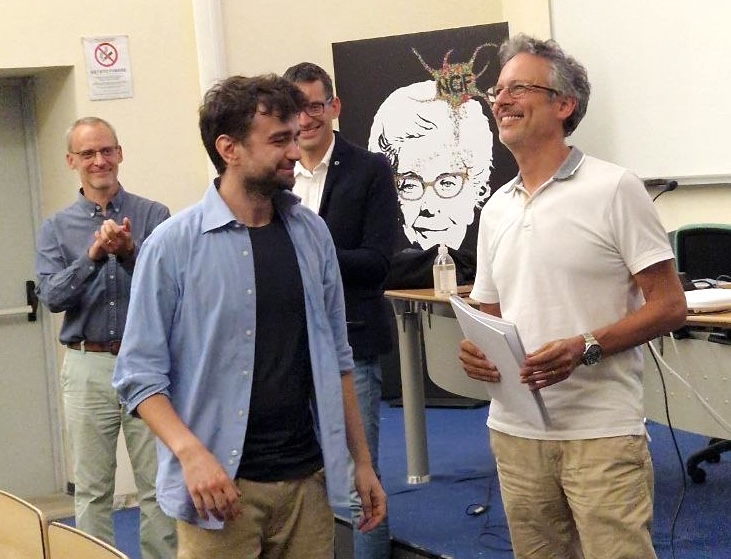16.01.2026
h. 14:30 Aula Querzoli, LENS
Group Seminar by Gabriele Gatta (Ba/Li Group):
Isomerization dynamics and detection of single phonon excitations in trapped ions sustems
18.12.2025
h. 14:30 Aula Querzoli, LENS
Group Seminar by Krishan Joshi (Yb-Tweezers Group):
Yb atoms trapped in tweezer arrays for quantum computation
14.11.2025
h. 14:30 Aula Querzoli, LENS
Seminar by Christian Mancini:
Entanglement engineering in a high-finesse optical ring cavity with ultracold strontium atoms
31.10.2025
h. 14:30 Aula Querzoli, LENS
LENS Enrico Fermi Colloquium by Prof. David P. De Mille:
Probing new CP-violating physics at TeV-PeV scales via precision measurements in cold and ultracold molecules
17.10.2025
h. 14:30 Aula Querzoli, LENS
Seminar by Beatrice Donelli:
Orthogonalization speed-up from quantum coherence after a sudden quench
19.09.2025
h. 14:30 Aula Querzoli, LENS
Group Seminar by Parvathy Sekhar (Dy Group):
Building a new Dipolar Quantum Gas Machine
17.09.2025
h. 11:30 Aula Querzoli, LENS
Seminar by Dr. Cosetta Baroni (Institut für Quantenoptik und Quanteninformation (IQOQI, Österreichische Akademie der Wissenschaften and Institut für Experimentalphysik, Universität Innsbruck, Innsbruck, Austria):
The moving Fermi polaron
17.09.2025
h. 10:30 Aula Magna, Physics and Astronomy Department
Seminar by Giulia Del Pace (Li Group):
Quantum simulation and atomtronics with ultracold atomic Fermi gases
21.07.2025
h. 11:00 Aula Magna, Physics and Astronomy Department
Seminar by Prof. Lauriane Chomaz (University of Heidelberg, Germany):
Structural Transition within Two-Dimensional Supersolids of Quantum-Stabilized Dipolar Gases
h. 12:00 Aula Magna, Physics and Astronomy Department
Seminar by Philipp Lunt (University of Heidelberg, Germany):
Quantum Hall states with rotating fermionic atoms
18.07.2025
h. 11:00 Aula Querzoli, LENS
Seminar by Prof. Peter Hannaford (Optical Sciences Centre Swinburne University of Technology, Melbourne, Australia):
Time-tronics: from temporal printed circuit board to quantumcomputer
11.07.2025
h. 14:30 Aula Querzoli, LENS
Group Seminar by Luca Cavicchioli (KRb Group):
Condensate Shells in K-Rb Mixtures
13.06.2025
h. 14:30 Aula Querzoli, LENS
Group Seminar by Shawn Storm (Sr Rydberg Group):
Single Sr atoms trapped in tweezers arrays for quantum simulation
10.06.2025
h. 12:00 Aula Querzoli, LENS
Seminar by Dr. Stefan Lannig (JILA, USA):
Superexchange and dipole-dipole interactions in a 3D lattice clock
29.05.2025
h. 16:15 Aula Querzoli, LENS
Seminar by Prof. Li You (Tsinghua University, China):
Observation of disorder-induced interacting topological phase in an atom array
26.05.2025
h. 11:45 Aula Magna, Physics and Astronomy Department
Seminar by Prof. Vandelei S. Bagnato (Instituto de Fisica de Sao Carlos (USP-IFSC), Brazil):
Observation of Relaxation Stages in a Nonequilibrium Closed Quantum System: Decaying Turbulence in a Trapped Superfluid
16.05.2025
h. 14:30 Aula Querzoli, LENS
Group Seminar by Beatrice Restivo (Cr/Li Group):
Updates from LiCr lab
13.05.2025
h. 10:00 Aula Magna, Physics and Astronomy Department
Seminar by Prof. Aephraim Steinberg (University of Toronto, Toronto, Canada):
Quantum archaeology – probing what atoms and photons were doing before we looked at them
09.05.2025
h. 14:30 Aula Querzoli, LENS
Group Tutorial by Andreas Trenkwalder(Cr/Li Group):
RF technologies (part 1)
10.04.2025
h. 14:30 Aula 4D, Physics and Astronomy Department
Seminar by Stefan Willitsch (University of Basel, Switzerland):
Quantum metrology with single trapped molecules
28.03.2025
h. 14:30 Aula Querzoli, LENS
Group Seminar by Alessio Ciamei (Cr/Li Group):
Cooling our way to particle physics: ultracold molecules for new physics searches
21.03.2025
h. 14:30 Aula Querzoli, LENS
Group Seminar by Marcia Frometa Fernandez (Li Group):
Measuring angular momentum in a ring Fermi superfluid
13.03.2025
h. 09:15-17:00 Aula Querzoli, LENS
Workshop talks:
Quantum Fluids of Light and Matter
28.02.2025
h. 09:45 Aula Querzoli, LENS
Group Tutorial by Vladislav Gavryusev (Sr Rydberg Group):
Laser Frequency Stabilization and linewidth characterization
14.02.2025
h. 14:30 Aula Querzoli, LENS
Group Seminar by Niccolò Preti (Dy Group):
Partially quantized currents in superfluids and supersolids
31.01.2025
h. 12:00 Aula Querzoli, LENS
Seminar by Igor Ferrier-Barbut (Institut d`Optique, Palaiseau, France):
Collective light scattering on a chain of single atoms





